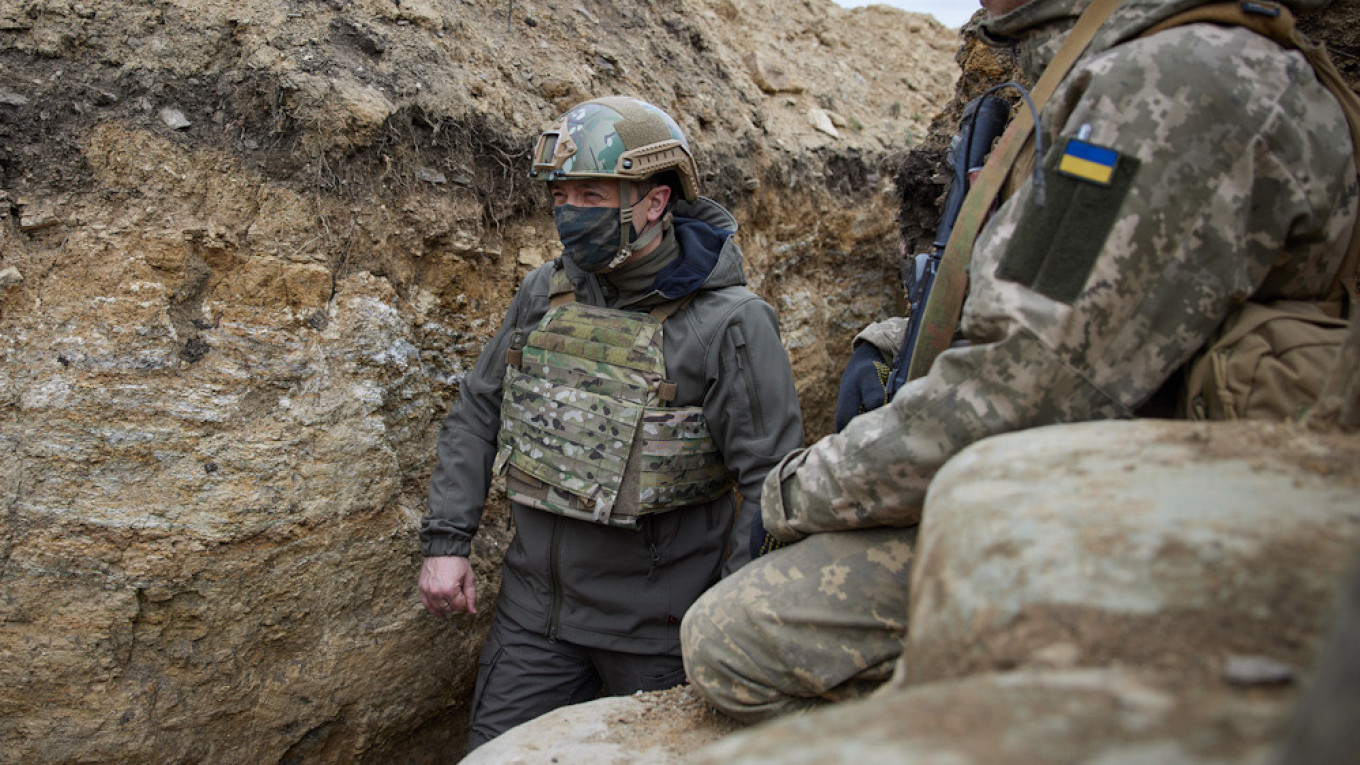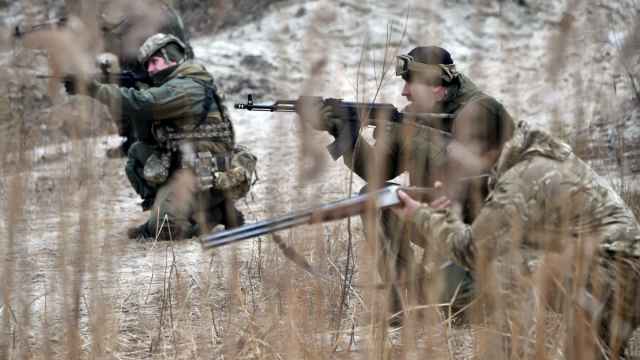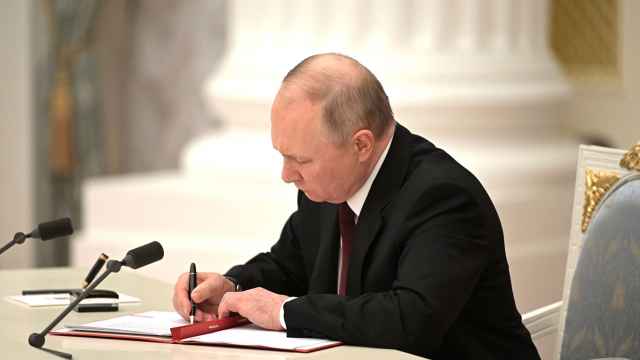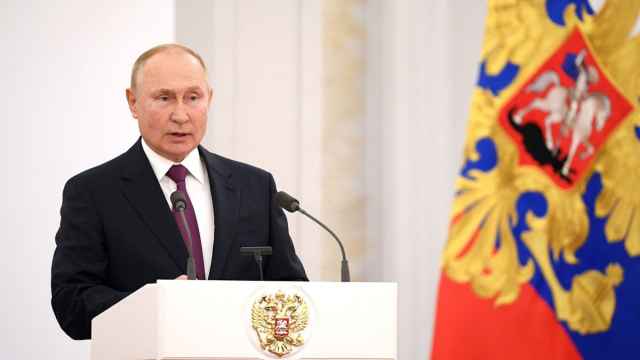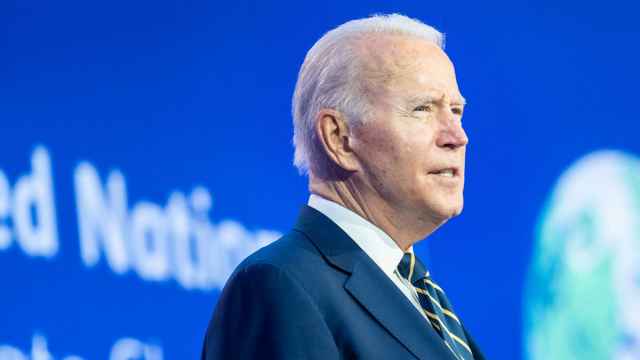Tensions between Ukraine and Russia, accused of massing troops near their border and on the Crimean peninsula it annexed in 2014, have intensified since the start of the year.
Deadly clashes between Ukrainian forces and pro-Russian separatists in eastern Ukraine have since taken place frequently, after a record ceasefire lasting several months.
'Obstruction'
The European Court of Human Rights on January 14, 2021, rules a complaint brought by Ukraine against Russia alleging human rights violations in the Crimean peninsula in 2014 is "partly admissible."
At the United Nations on February 11, Russia is accused of blocking a solution to the conflict.
On February 26, new president Joe Biden says that the United States will "never" accept the annexation of Crimea.
On March 2, European Union President Charles Michel announces during a visit to the frontline that the EU will maintain its sanctions on Moscow in return for its support for pro-Russian separatists.
Upsurge
Kiev on March 5 denounces an upsurge of violence in the east of Ukraine, and calls on its Western allies to intervene.
Moscow says it fears "full-fledged war" in the area.
On March 9, Kiev calls for a summit with France and Germany, co-sponsors of the peace process, and Russia.
Four Ukrainian soldiers are killed on March 26 in a bombardment 30 kilometers (19 miles) to the north of the eastern flashpoint city of Donetsk, the heaviest daily toll since 2019 in the region.
Moscow and Kiev accuse each other on March 30 of causing an escalation in violence.
Russian soldiers at borders
On March 31, Kiev and Washington say there are Russian troop movements in Crimea and at the Russia-Ukraine border, close to territory controlled by separatists.
On April 1, Ukrainian President Volodymyr Zelensky accuses Russia of massing tens of thousands of troops on the border and in Crimea. The Kremlin calls on Kiev and the West not to "worry" and says Russia is moving its armed forces within its territory "at its discretion."
The United States warns Russia against "intimidating" Ukraine.
The next day the Kremlin says it is "not threatening" Ukraine, tells Kiev to stop its "provocation" and warns the West against sending troops.
Western support
Biden on April 2 affirms "unwavering support" for Ukraine.
Berlin and Paris on April 3 call for an "immediate de-escalation," with the European Union the next day expressing "severe concern."
The Kremlin says on April 6 that NATO membership for Ukraine would only "worsen the situation," after Zelensky urges NATO to speed up his country's membership plan.
Germany on April 8 calls on the Kremlin to reduce its military presence at the border.
NATO and allies
On April 9, Kiev rejects Moscow's allegations that it is preparing a military offensive against the eastern rebels, accusing Russia of seeking a pretext to attack it.
Turkey says that the United States plans to send two warships to the Black Sea via the Bosphorus.
The Kremlin says on April 11 that it is not moving towards war with Ukraine, as U.S. Secretary of State Antony Blinken warns of "consequences" if Russia acts aggressively towards Ukraine.
On April 12, G7 foreign ministers and the EU's foreign policy chief urge Russia to stop "provocations" and to "de-escalate tensions."
Moscow complains on April 13 that American troops are currently being transferred from "North America across the Atlantic to Europe," a day after Washington's decision to send 500 extra soldiers to Germany.
NATO says Russia's military build-up is "considerable" and "unjustified" during a meeting with the Ukrainian Foreign Minister Dmytro Kuleba.
Accusing the United States and NATO of transforming Ukraine into a "powder-keg" and faced with "threatening" NATO actions, Moscow says it is carrying out military exercises at the Ukrainian border.
Biden urges Russian counterpart Vladimir Putin to ease the mounting tensions.
A Message from The Moscow Times:
Dear readers,
We are facing unprecedented challenges. Russia's Prosecutor General's Office has designated The Moscow Times as an "undesirable" organization, criminalizing our work and putting our staff at risk of prosecution. This follows our earlier unjust labeling as a "foreign agent."
These actions are direct attempts to silence independent journalism in Russia. The authorities claim our work "discredits the decisions of the Russian leadership." We see things differently: we strive to provide accurate, unbiased reporting on Russia.
We, the journalists of The Moscow Times, refuse to be silenced. But to continue our work, we need your help.
Your support, no matter how small, makes a world of difference. If you can, please support us monthly starting from just $2. It's quick to set up, and every contribution makes a significant impact.
By supporting The Moscow Times, you're defending open, independent journalism in the face of repression. Thank you for standing with us.
Remind me later.


